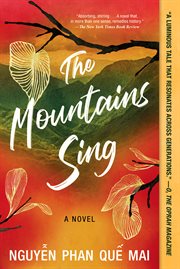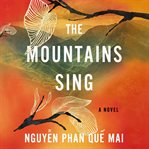The mountains sing
eBook - 2020
The International Bestseller New York Times Editors' Choice SelectionWinner of the 2020 Lannan Literary Awards Fellowship "[An] absorbing, stirring novel . . . that, in more than one sense, remedies history." -The New York Times Book Review "A triumph, a novelistic rendition of one of the most difficult times in Vietnamese history . . . Vast in scope and intimate in its telling . . . Moving and riveting." -VIET THANH NGUYEN, author of The Sympathizer, winner of the Pulitzer Prize With the epic sweep of Min Jin Lee's Pachinko or Yaa Gyasi's Homegoing and the lyrical beauty of Vaddey Ratner's In the Shadow of the Banyan, The Mountains Sing tells an enveloping, multigenerational tale of the Trần f...amily, set against the backdrop of the Việt Nam War. Trần Diệu Lan, who was born in 1920, was forced to flee her family farm with her six children during the Land Reform as the Communist government rose in the North. Years later in Hà Nội, her young granddaughter, Hương, comes of age as her parents and uncles head off down the Hồ Chí Minh Trail to fight in a conflict that tore apart not just her beloved country, but also her family. Vivid, gripping, and steeped in the language and traditions of Việt Nam, The Mountains Sing brings to life the human costs of this conflict from the point of view of the Vietnamese people themselves, while showing us the true power of kindness and hope. The Mountains Sing is celebrated Vietnamese poet Nguyễn Phan Quế Mai's first novel in English. Born into the Red Delta of Northern Việt Nam, Dr. Nguyễn Phan Quế Mai grew up in the Mekong Delta, Southern Việt Nam. She is a writer and translator who has published twelve books of poetry, fiction and non-fiction in Vietnamese and English and has translated seven books. Her last book, The Mountains Sing, was an international bestseller, runner-up for the 2021 Dayton Literary Peace Prize, winner of the 2021 PEN Oakland/Josephine Miles Literary Award, the 2020 Lannan Literary Award Fellowship, and other prizes. Her writing has been translated into more than 15 languages and has appeared in major publications including the New York Times. She has a PhD in Creative Writing from Lancaster University. While working on her most recent novel, Dust Child, Quế Mai helped set up a scholarship program for Amerasians in Việt Nam (the Amerasian Hope & Future Scholarship). For more information, visit: www.nguyenphanquemai.com Winner of the 2021 PEN Oakland/Josephine Miles Literary Award Runner-up of the 2021 Dayton Literary Peace Prize Winner of the 2021 International Book Awards (Literary Fiction and Multicultural Fiction categories) Winner of the Blogger's Book Prize 2021 NB Magazine's Book of the Year Winner of the Blogger's Book Prize 2021 Finalist of the Audie 2021 Best Audiobook of the Year Award Winner of BookBrowse's Best Debut Award for 2020 A Best Book of 2020: NPR's Book Concierge * PopMatters * Washington Independent Review of Books * Real Simple * The Buzz Magazine * She Reads * NB Magazine * BookBrowse * Paperback Paris * Writer's Bone * Global Atlanta A Best Book of the Month/Season: The New York Times * The Washington Post * O, The Oprah Magazine * USA Today * Real Simple * Amazon * PopSugar * Book Riot * Paperback Paris * She Reads * We Are Bookish A Most-Anticipated Book of the Year: The New York Times * The Washington Post * PopSugar * The Millions * Library Journal * Lit Hub * The Week * She Reads A Book Riot Best Book for Book Clubs "A luminous, complex family narrative . . . The Mountains Sing affirms the individual's right to think, read, and act according to a code of intuitive civility, borne out of Vietnam's fertile and compassionate cultural heritage." -NPR "...
- Subjects
- Published
-
[United States] :
Algonquin Books
2020.
- Language
- English
- Corporate Author
- Main Author
- Corporate Author
- Online Access
- Instantly available on hoopla.
Cover image - Physical Description
- 1 online resource
- Format
- Mode of access: World Wide Web.
- ISBN
- 9781643750491
- Access
- AVAILABLE FOR USE ONLY BY IOWA CITY AND RESIDENTS OF THE CONTRACTING GOVERNMENTS OF JOHNSON COUNTY, UNIVERSITY HEIGHTS, HILLS, AND LONE TREE (IA).
Review by Publisher's Weekly Review
Review by Kirkus Book Review


